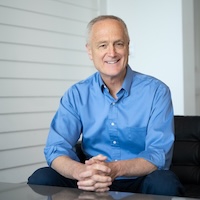What Draws Ezra Klein to Christianity
Among evangelical Christian twenty-somethings in the United States, I imagine that I am Ezra Klein's biggest fan.
Klein is a columnist for the New York Times who made his breakthrough in journalism during the blogging era of the early 2000s and has now risen to the top of the center-left chattering class. His influence over the Democratic Party may be at its zenith, having been the first prominent liberal to argue that Biden should drop out of the 2024 presidential race nearly three months before the debate that dismembered Biden's campaign.
Bari Weiss has pegged Klein one of the “most important liberal journalists working in the legacy press today.”
Klein's appeal stems from his ability to synthesize research across disciplines — from climate policy to social psychology to media theory — and distill it into some of the clearest writing on the internet. His curiosity extends beyond party lines, regularly hosting conservatives like Yoram Hazony, Ben Shapiro, and Matthew Continetti on his podcast. Recently, he praised Charlie Kirk's dialogical approach to politics — which ruffled so many feathers that some on the Left are pushing for his cancellation.
I was first drawn to him through his podcast nearly three years ago, and that is where his star shines brightest. Often he will calmly present the strongest form of his interviewee's argument—usually better than they can—before proceeding to deconstruct their premises and tear down the entire architecture of their reasoning, all in the tone of an earnest student arriving at an epiphany.
So I knew I was in for something special when Klein interviewed Ross Douthat about Douthat's new book defending the credibility of religious faith. They didn't disappoint.
Yes to Paranormal Activity, Meaning, and Moral Inheritance
To understand their conversation, you need some background on Douthat's book. Believe — which I highly recommend — argues that the physical design of the universe, the non-reducible nature of the human mind, and the continuation of supernatural activity even in our irreligious age make a compelling case for belief in God.
Douthat's argument is a sledgehammer to scientific materialism, the new atheist worldview which claims that all of reality is reducible to matter in motion. While materialism has never dominated globally — only 7% of the worldwide population is atheist and that number is likely to shrink — it remains prevalent in elite American circles, from Ivy League campuses to the newsrooms where Klein and Douthat work.
Aware of this, I listened to Douthat restate his book's argument with a lingering anxiety that Klein might respond with alternative findings in astrophysics research or neuroscientific studies, thereby refuting Douthat point by point.
Instead, Klein conceded, “that's why I'm not a materialist.” He loved Douthat's book and found himself "captivated by the idea that every moment might be a moral test." Klein was moved by Douthat's personal appeal to Christianity, drawn especially to what he called the "strangeness of Christianity" — its radical claim that there "is a godliness to those who do not have power."
Ezra Klein Is Not Alone
Klein's nuanced position — neither materialist nor traditionally religious — actually mirrors where most Americans find themselves.
83% of Americans believe in God or a higher power, including more than two-thirds of the irreligious. Nearly four in ten Americans – religious or otherwise – have witnessed what they consider a miracle. The same percentage of religiously unaffiliated Americans (38%) have had moments of sudden connection to “something beyond this world.” When it comes to the supernatural, America runs on Oprah, not Dawkins.
Beyond supernatural belief, many people like Klein remain drawn to religion's gift for infusing everyday life with meaning and moral purpose. Consider Jordan Peterson — arguably the most successful evangelist of our time judging by book sales. His message boils down to telling young men that every moment matters: make your bed, eat protein, discipline your children, live with purpose. Peterson may not be Klein's ideal messenger given their political differences, but the hunger for meaning is thoroughly bipartisan.
Consider also the John Mark Comer phenomenon. Comer begins where Peterson does — a good life needs moral structure — and builds it through spiritual practices rather than psychological discipline. To be sure, they are different. Comer's therapeutic, West Coast style stands in contrast to Peterson's more demanding, fatherly approach. Where Peterson calls for alignment with the universe's moral structure, Comer invites followers into an apprenticeship to Jesus. But both invite their followers into a way of life where every minute is charged with purpose and meaning.
Klein's attraction to Christianity extends beyond supernatural belief and daily purpose to its ethical legacy.
He's in good company. Take three unlikely allies: Ayaan Hirsi Ali, a critic of religious fundamentalism; Douglas Murray, a gay conservative atheist; and Tom Holland, a historian fascinated by antiquity. Despite vastly different starting points, they've all concluded that Christianity established the moral foundations of the West: our commitment to human rights and our particular attention toward those who do not have power.
Yes to Visions, Yes to Mystery
Later in his conversation with Douthat, Klein mentions that he once had a vision he could not explain. It was "terrifying and very Jewish in nature," a side of Judaism he had not experienced before. Douthat asks why he didn't then join a synagogue and practice his Judaism.
Klein responds with several reasons:
- No single religious tradition — Judaism or otherwise — can encompass or explain all the supernatural activity that believers claim to have experienced around the world.
- Organized religions have been corrupted through their entanglement with institutional power.
- Given points one and two, it is more comfortable to accept the mystery than to commit completely to one religion.
Klein’s third point intrigued me because it's not really an objection, it's a confession. Klein went on to say that he’s come to appreciate the "mystery" of the universe's origins, along with the humble posture that comes from not having all the answers.
I want to affirm that impulse. It makes sense to say “there's a lot of diverging evidence out there, and I'm at peace accepting that I'll never quite figure it out." That statement respects the strangeness of the universe, the mystery of Being that no human mind can fully comprehend. But it’s also a conversation stopper, a throwing up of the hands about the most fundamental questions of human purpose and universal origins.
Christianity takes off at the same place where Klein lands: it affirms that no mind could conceive or fully comprehend the hidden truth that lies at the heart of the universe, the "mystery" of the gospel to quote the apostle Paul.
A Stranger Mystery
Consider this description from Sarah Ruden:
“Christianity arose when a small group of Jews became convinced that their leader, a poor and relatively uneducated man from the tiny town of Nazareth (a backwater of the backwater Galilee), whom the Romans had tortured to death as a troublemaker, had risen from the dead and ascended into heaven, thus delivering mankind from sin and death—and that this was the point of all existence in the universe."
Believing this story won't drain the universe of mystery; indeed, it will make it far stranger. Say what you want about the early Christians, but they weren't unimaginative — the audacity to believe that a man who walked dirt roads in sandals, whose blood they watched spill on a cross, was the same being who spoke galaxies into existence.
For C.S. Lewis,
"That is one of the reasons I believe Christianity. It is a religion you could not have guessed. If it offered us just the kind of universe we had always expected, I should feel we were making it up. But, in fact, it is not the sort of thing anyone would have made up. It has just that queer twist about it that real things have."
Christianity does not squelch mystery. Rather, the question for Klein, and for anyone else enchanted by the unknown: what could be stranger or more wondrous than this story being true?
Lakelight Monthly
Curated resources, delivered on the last Saturday of the month.
By subscribing you agree to with our Privacy Policy and provide consent to receive updates from our company.













